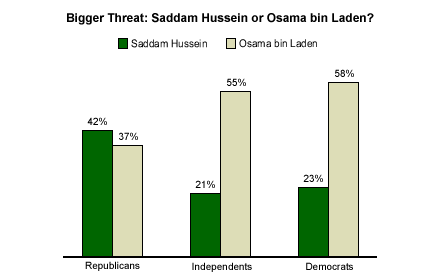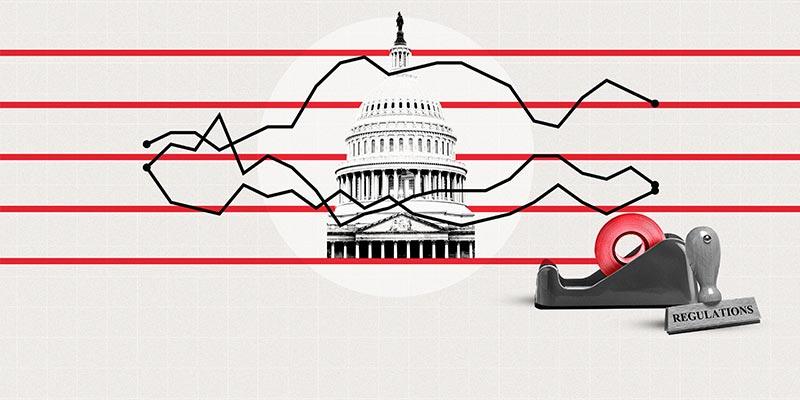Heroes and villains are often at the core of Western storytelling -- cops and robbers, men in black hats against men in white hats. The story of America's role on the world stage tends to be framed no differently: for decades, the villain was the Soviet Union. Given the dual threat posed by al Qaeda leader Osama bin Laden and Iraqi President Saddam Hussein, which is currently most likely to fill that "chief antagonist" role in Americans' consciousness?
A recent Gallup Poll asked Americans who they believe poses the greater threat to the United States, Iraq and Saddam or the al-Qaeda terrorist network and bin Laden. Half (50%) say bin Laden, while less than a third (28%) say Saddam. Another 18% volunteer that they are both equally threatening to the United States. These findings are essentially consistent across several demographic groups, including age, gender and education. There is, however, a significant difference of opinion when it comes to political affiliation.
The Politics of Villainy
Republicans (42%) are twice as likely as independents (21%) and Democrats (23%) to say they think Iraq and Saddam are the greater threat to the United States. On the other hand, a majority of Democrats (58%) and independents (55%) say al Qaeda and bin Laden represent a greater threat, while just a little more than a third of Republicans (37%) say this.

These differences are reflective of the internal political climate in America, especially with regard to the prospect of war with Iraq. Republicans are more apt to agree with the leader of their party, President Bush, and identify Iraq as the greatest threat. An examination of the public's willingness to give Bush the authority to take action against Iraq further illustrates this point.
When asked whether Congress should or should not vote to "give President Bush unlimited authority to use military action against Iraq whenever he feels it is necessary," the American public is split: 47% say Congress should give the president this authority, while 51% say it should not. Republicans (75%) are much more likely to say it should than are political independents (42%) or Democrats (30%).
Proximity in Time and Space
Iraq currently dominates the headlines as the Bush administration contemplates a war. But while the administration claims Iraq is developing weapons of mass destruction, it has yet to offer the public more than circumstantial evidence. Al Qaeda's ability to harm Americans on their own soil, however, was made abundantly clear on Sept. 11, 2001.
Americans' perceptions of the immediacy of the threat posed by bin Laden and al Qaeda certainly remain a year later: in response to a poll from early September of this year, the vast majority of Americans (86%) said they think there are terrorists associated with bin Laden currently in the United States who are capable of launching a major terrorist attack against the United States. And a poll from early last month found 59% of Americans still think it is either "very likely" or "somewhat likely" that the United States will be able to capture or kill bin Laden.
*Results are based on telephone interviews with 1,010 national adults, aged 18 and older, conducted Sept. 20-22, 2002. For results based on the total sample of national adults, one can say with 95% confidence that the maximum margin of sampling error is ±3%.
